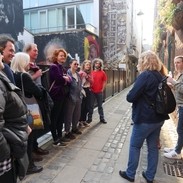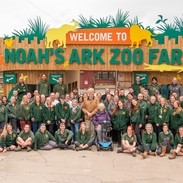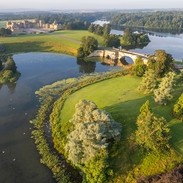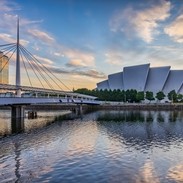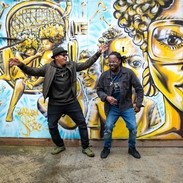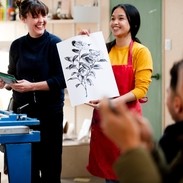When do I tell?
Photo by: National Forest Company

Prior to booking/purchase
Tell customers why they should buy from you
Often, we think marketing is all about this moment, communicating pre-purchase to first time consumers.
Browsing for options is time consuming and customers make decisions quickly, when reading less information. So, there is little time to explain why your product is better value, better quality, or simply an appealing proposition as a result of the sustainability work you do.
As a business manager, you can use sustainability for two reasons:
1. To create an impression:
Branding uses images, text and other cues to create an impression that yours is the kind of business the client identifies with. This is all about creating feelings amongst your customers. Sustainability, in its broader sense, can help say that you are one of the good guys and that you can deliver on your promises. But that in itself doesn’t pay the bills, so…
2. To help customers take decisions:
Provide an incentive to your customers to buy now. Think specifically about what are the different attributes that make your customers choose between you or someone else. What are the needs they are trying to satisfy at this point? And how does a more sustainable product meet these needs?
For example, hotel chains are going beyond saying they have a corporate social-responsibility policy and certified management system. They now calculate the environmental cost of your overnight stay or of business events, to be able to promote themselves as lower carbon than competitors. But then these hotels also need to tell customers how travel to their premises in a low carbon way and importantly, what to do there without needing a car.
A little taste before your most important day
Our wedding fair is the perfect venue to meet local artists and plan your dream wedding."

What we do
We run a multi award-winning farm-based hospitality venue. We focus on rustic-barn weddings, corporate events, a cookery school powered by a wind turbine, llama trekking and we serve vintage-themed afternoon teas at weekends. We are also a working hill farm and we have incorporated recycling, food waste reduction, composting and energy saving into everything we do.
How we tell
On site, we communicate our sustainable practices to the public through signage and noticeboards throughout the farm. When people book onto cookery courses, we talk to them about the provenance of food and animal welfare just as much as how to cook delicious, rustic, artisan style food.
But for our weddings, messages and pictures on our website and social media emphasise our unique venue as the ‘perfect country chic’ – using straw bales as seating – to ‘let your imagination run wild’.
And for a more personal and authentic taster beforehand, we host free wedding fairs. These offer a networking opportunity where potential customers can support the local economy and find everything they need – from dress makers to musicians, from set designers to hair stylists. We offer them a place where they can see for themselves what genuine Lancashire weddings are all about.
Our top tip
Tell customers beforehand why your business is special. Offer them a taster experience where they can see for themselves and choose.
Between booking and arriving
Tell your customers how to prepare for their visit
Customers need to know what to bring with them, and what to expect. Knowing at this stage what is acceptable behaviour will really help: whether this is information on the dress code, or how to respect other users who are there.
This is the time to encourage the journey to and from your premises and the stay with you, as more environmentally-friendly. For example, provide information on public transport (timetables and destinations), the Traveline website or phone service, a list of car free things-to-do nearby and explain how you will help your visitors to find any public transport information they may need during their stay.
If you want to encourage your customers to arrive by public transport, give them an incentive to leave their car at home: For example, a discounted stay or entry to an attraction, free coffee and cake on arrival, or bike hire incentives. But what’s actually more important is to give them a list of things to do, and instructions on how to get around without a car when they are with you.
Encourage customers to book activities sooner rather than later, particularly where there is limited capacity, such as theatres, concerts and certain restaurants.
Tell them what to bring, and what they will find during their stay with you, from walking books and poles, to reading material. All of this adds to a sense of customer care.
Equally if you can source local goods and pre-cooked homemade meals for their stay, this is the time to encourage pre-booking. This is particularly beneficial for self-catering properties in rural locations, but is rarely done often enough.
Know your customers
We impress customers by exceeding their expectations"
Photo by: VisitBritain/KOLOstock/Getty Images

What we do
We offer tailored cycling tours to fit customers with different interests. Our themed tours use local or historic places to stay (40% of them are members of green organisations and ALL of them serve local food), local restaurants and craft shops and visit a range of tourist attractions. We emphasise the sense of place, authenticity and quality aspects of our tours.
How we tell
We create a rapport with our customers beyond selling them a service. Our tours are customised by involving the customer in decisions like where to stay and eat, and what to see by cycling or walking.
Later, customers only need to follow our instructions to find us. We include how to arrive through to information on the departure point by public transport. We also keep them posted about weather changes or local events they might want to see.
Thanks to the information we provide while booking and the options customers choose, we already know what they expect on arrival. This is evident when we welcome them with tailored maps, with for example, for the places they chose, and similar attractions.
And for the more curious: we include paths that only locals know – for example a historic route used to move sheep mapped out by pine trees that can only be noticed by air.
Our top tip
After booking, keep your customers posted and use the information you have of them to exceed their expectations on arrival. You will increase their loyalty and gain repeat bookings and word of mouth recommendations.
On arrival
No second chance to make a first impression
This is the acid test: Will your customer really think all that talk was just greenwashing? Recovering from a bad first impression will be hard. The look or feel of your business – from accommodation providers and attractions – to conference venues and restaurants, sends a message about whether you really care about sustainability.
Your building communicates much more than any words, so look for cues as to what might send confusing messages:
- Will your entrance send the message of wasteful lighting and heat pumped out of the front door?
- At reception, do you promote hiring 4x4s or bicycles and/or local walks?
- Are there patio heaters, when you make claims to reduce carbon emissions?
- Is the bedroom air conditioning set at 18 degrees or the heating to 22?
Many customers don’t like to ‘make a fuss’ and particularly in businesses where customers have minimal interaction with staff, so it’s the building that communicates on your behalf. The amount of text and location of this communications needs to help the customer guide themselves through the building, as well as how to behave inside it.
Messages located where guests will be walking have to be extremely short. If they will encounter the message sitting down, you can tell them more. If you have international clients, consider the complexity of the words you use and try to use more pictures or diagrams.
Smaller businesses such as self-catering properties, get to talk to customers one to one, so on arrival they get a chance to share their values while showing guests to their accommodation and explaining how different aspects work such as utilities and heating.
First impressions matter
Our efforts welcome customers."
Photo by: VisitBritain/Sam Barker

What we do
We run a family business that offers locally sourced food, promotes green local activities and all staff members follow the three Rs (reduce, reuse and recycle). We also use local wood and plants, and warm energy-saving light bulbs to offer a cosy, welcoming environment. We share our sustainability practices and local activities on our website and social media, but we know that when customers arrive, it’s the food and the experience that matters.
How we tell
Our communication on site is all about having a quality experience. As soon as customers arrive, they can feel this. From our warm decor to our passionate team service: from suggesting local activities that make Cornwall special to fresh, tasty food. Our blackboard is full of local information and our menu introduces our organic and seasonal ingredients to make it clear that we care about our products and suppliers.
We also use humour, such as: ‘Time & tide waits for no man. Good food takes a little longer’. This is used to reinforce the message of quality through slow food and patience. We make their waiting time a reason to enjoy food even more, while relaxing in our atmosphere with our dedicated service.
Our top tip
Offer a welcoming environment where your sustainability helps to create a unique first impression, for example, your cosy atmosphere with local wood and plants. Also, provide subtle messages where sustainability means quality. For example, locally sourced food tastes better, is healthier and does good.
During the stay/visit
This is your best chance to make loyal customers
Decide how much you want your communication to affect the customer experience, or whether it is just in the background, depending on the kind of business you are.
Some five-star hotels are reducing all hard copies of information displayed to ensure the perception of quality is not affected. Other businesses opt to provide short messages throughout (for example, providing notes in the shower about reduced water consumption or by the bedroom door explaining about not leaving the lights on to reduce electricity consumption).
For accommodation providers, the bedroom browser is the best place for all the background and more technical information. This all helps reinforce the range of things you do and provide. Those committed few who do read this are likely to appreciate it.
For your bedroom browser, you could have two lists:
• These are the things you can see:
Stroll through the vegetable garden, taste our filtered water that saves on glass transport and waste, our clever lights come on automatically when needed.
• These are the things you can’t see:
With your help we raised £500 for our local wildlife club, we have saved enough oil/gas/electricity to do [insert your own message] and we have saved enough water to do [insert your own message] the carbon emissions we reduced would be able to run [insert your own message].
Digital QR codes are increasingly used to provide information without having to print out lots of hard copies. These can work especially well for younger demographics. But be aware that not all visitors will be able to (or will want to) access information this way, so have some hard copies to hand too. Your wifi needs to be up to the job too.
After the stay/visit
Stay in touch with your customers
Seasonal and event-related sustainability messages about your business and surroundings provide a purpose to remind customers about your business, and encourage repeat bookings.
Sustainability-related messages help you make human connections that build on trust and a sense of belonging:
- If you told your customers that the money saved from reusing towels goes to planting trees, tell them how much you have fundraised so far.
- If your customers saw you put up bird boxes or bird feeders, tell them how many are occupied, or which birds you can now see in the garden.
- If you provided scholarships to study for local children, tell customers how well those children are doing.
- A large family-hotel chain publishes a yearly newsletter that among other things provides an update of births, marriages, retirements and deaths amongst their personnel. It’s one more way to communicate that their staff are employed for the long run and to encourages customer loyalty that for them, really works.
- Have a monthly dish where all ingredients come from a different farm, and invite the farmer to eat at your business the first Saturday of the month. Make this into an event: create a local connection and a reason to remind customers to keep coming back.
Say it with flowers
We help customers reminisce about their holidays with meaningful marketing"
Photo by: West Midlands Growth Company

What we do
We offer a welcoming atmosphere by taking care of the environment and making sure guests have a great time. Families love it when we show them the area, and late in summer we identify and pick wild flowers together.
How we tell
We love talking to our guests about the landscape and wildlife, in the context of managing a farm sustainably in the countryside. As part of this we identify, collect and press flowers with these families – much as we did with our own children and grandchildren. We keep them pressed in the cottage for them, and once ready, we post them as a memento of their holiday with us.
Sending these flowers in the post has been such a big success! It has contributed to families reminiscing about their time with us and meaningful time away from it all. We usually hear that we made them feel special by taking the trouble to send them. The sense of bonding and belonging with the place, reinforced by these flowers, often leads to further bookings.
Our top tip
Think differently about how you can care for customers and try to develop real bonds with your past customers, rather than sending them a boring impersonal newsletter. Take advantage that they already know you, and remind them how much fun they had with you and that they are important.
Navigation
Previous:


